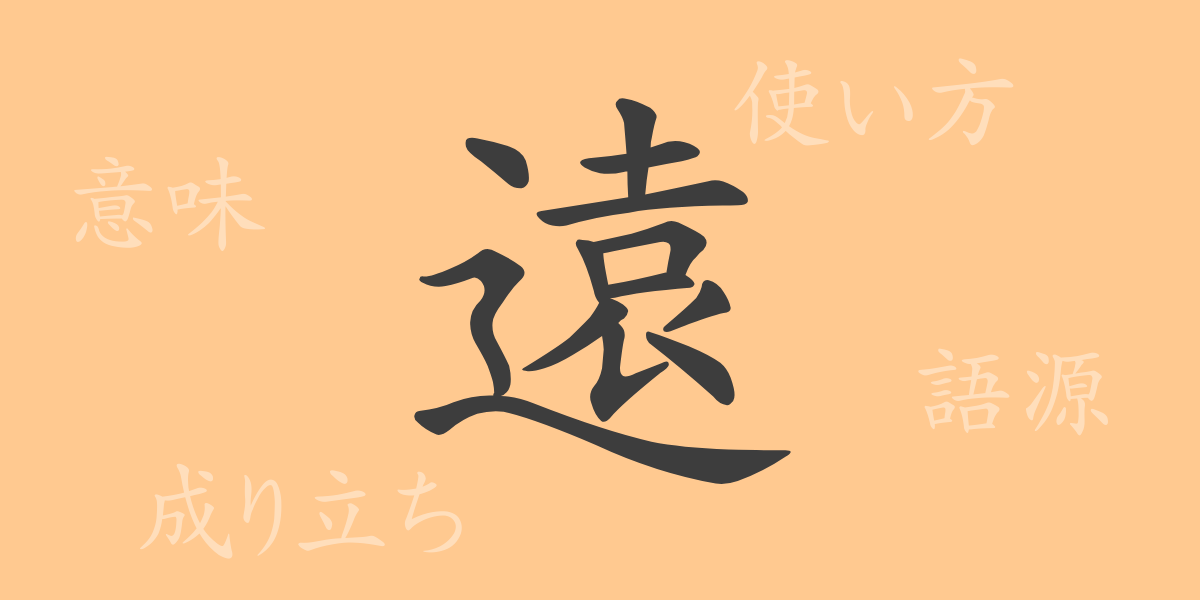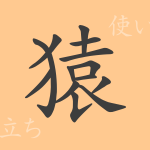“
The kanji character “”遠”” (Tō), listed in the Japanese Jōyō Kanji (Jōyō kanji) table, is a character with deep and rich meaning. What kind of history and meaning are embedded in this kanji that is frequently used in our daily lives? In this article, we will explore in detail the origin, meaning, usage, reading, and related idioms and proverbs of the kanji “”遠”” (Tō). Let’s touch upon the world of “”遠”” (Tō) together while feeling the depth of the Japanese language.
The Origin (Etymology) of 遠 (とお, Tō)
The kanji “”遠”” (Tō) is a pictograph born in ancient China. It originally consisted of a combination of “”山”” (Yama), which represents the shape of a mountain, and “”𢆶”” (Chin) located at a distance from the mountain, depicting the appearance of indicating a distant place beyond the mountains. As time passed, this kanji evolved under the influence of various cultures and settled into its current form. “”遠”” (Tō) has come to be used not only for the length of physical distance but also for temporal distance and in a metaphorical sense.
The Meaning and Usage of 遠 (とお, Tō)
The kanji “”遠”” (Tō) has meanings such as “”long distance,”” “”taking time,”” and “”not close.”” It is also used to indicate a temporal length, such as in “”遠い将来”” (Tō-i -shōrai, distant future), or to express the tenuousness of a relationship, as in “”遠い親戚(Seki)”” (Tō-i shinseki, distant relative). In terms of usage, it functions as a suffix for adjectives and verbs and frequently appears as part of various compound words.
Reading, Stroke Count, and Radical of 遠 (とお, Tō)
The kanji “”遠”” (Tō) has several readings.
- Reading: The on’yomi is “”en,”” and the kun’yomi is “”tō.i.””
- Stroke Count: A total of 13 strokes
- Radical: The radical is “”辵”” (Shinnyō)
Idioms, Phrases, and Proverbs Using 遠 (とお, Tō) and Their Meanings
There are numerous idioms, phrases, and proverbs containing “”遠”” (Tō). Here are a few examples.
- 遠慮 (Enryo): Being reserved or the feeling of doing so.
- 遠足 (Ensoku): A short trip taken as part of education.
- 遠視 (Enshi): A condition of vision in which nearby objects are difficult to see.
- 遠回り (Tōmawa-ri): Taking a detour instead of going directly to the destination.
- 遠山の金さん (Tōyama -no -Kin-san): A nickname for a chivalrous character brimming with a sense of justice, modeled after Tōyama Saemon-no-jō Kagemoto, a figure from the late Edo period.
These idioms, phrases, and proverbs demonstrate the richness of Japanese expressions.
Summary of 遠 (とお, Tō)
The kanji “”遠”” (Tō), as its form suggests, is a versatile character representing physical distance, temporal length, and the remoteness of relationships. In Japanese, it is used in various compound words and phrases, playing an important role in our language. We hope that through this article, you have been able to feel the depth of meaning that “”遠”” (Tō) possesses and the richness of Japanese expressions.
“

























